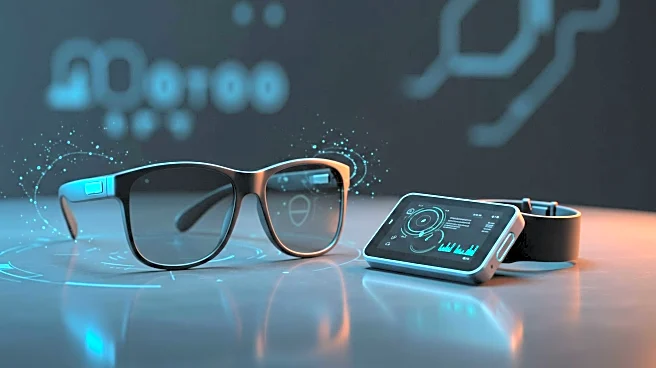What's Happening?
Meta is set to launch its first smart glasses, named Hypernova, featuring a built-in display and a neural wristband. Scheduled for release at Meta's Connect conference on September 17, 2025, the glasses are priced at $800, a reduction from the initially planned $1,000-$1,400 range. Hypernova aims to compete directly with smartphones by offering visual information in the user's field of view, unlike previous models that relied on audio feedback. The glasses will include a monocular display integrated into the right lens, showing notifications, navigation directions, and camera previews. The neural wristband uses surface electromyography (sEMG) technology to detect muscle signals, allowing users to control the glasses through subtle finger gestures. This marks a significant shift from voice commands or touch interfaces, enhancing user interaction.
Why It's Important?
The launch of Hypernova represents Meta's strategic move to establish leadership in the next major computing platform transition. By pricing the glasses at $800, Meta aims to accelerate mainstream adoption, positioning them as a potential primary computing interface. This move could challenge the dominance of smartphones, particularly Apple's iPhone lineup. The smart glasses market is experiencing significant growth, with shipments increasing by 110% year-over-year in the first half of 2025. Meta's decision to integrate neural interface technology could solve longstanding input challenges, potentially revolutionizing human-computer interaction. Success in this venture could validate Meta's vision of the 'metaverse' transition and provide new revenue streams beyond traditional social media advertising.
What's Next?
Meta's Hypernova launch will be closely monitored for key performance indicators such as preorder velocity, return rates, and daily active usage metrics. These will indicate whether the device can transition from a novelty gadget to an essential computing platform. The reception of Hypernova will provide insights into consumer readiness for post-smartphone computing paradigms. Success could accelerate industry-wide investment in augmented reality technologies and establish new standards for wearable computing interfaces. Major technology companies, including Apple and Google, are reportedly developing competing smart glasses platforms, suggesting the emergence of a new competitive battleground in personal technology.
Beyond the Headlines
Hypernova's introduction could disrupt adjacent industries, including traditional eyewear manufacturers and smartphone accessory companies. Privacy concerns, particularly in European markets, may influence adoption patterns due to the device's always-available cameras and AI processing capabilities. The lack of a dedicated app store at launch may limit perceived value compared to smartphones' expansive application libraries. The device's success or failure will have significant implications for Meta's strategic direction and resource allocation, potentially influencing the broader pace of technological transformation in personal computing.










